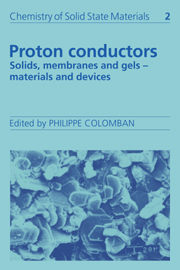Preface
Published online by Cambridge University Press: 04 May 2010
Summary
Since the discovery of ice conductivity more than one hundred years ago in Japan, proton transport in solids has aroused considerable interest. Currently, proton conductors appear interesting because of protonic transport in biophysical processes, and – as with many other ionic conductors – since they can be used in numerous electrochemical devices such as batteries, fuel cells, chemical sensors, electrochromic displays and supercapacitors. Furthermore, energy systems based on hydrogen are a possible answer to prevent earth pollution. The number of materials, crystalline or amorphous, organic or inorganic, solids and gels, where proton transport is known to play an important role, has increased during the last few years. At the same time, a better understanding of proton transfer mechanism seems to have been reached. Recently, the debate on cold fusion has made most scientists aware of the proton peculiarity.
It is hardly an exaggeration to say that everything about hydrogen is unique. Mendeleev could not find a place for this element in the Periodic Table. The hydrogen ion ‘H+’ is an ion without an electron, a bare proton and so, protons are usually solvated. The literature about proton transport is also unique and must be read with caution. For instance, early measurements on ice by Eigen, de Maeyer & Spatz showed a measurable ionic conductivity which was explained in proton defect terms, protons diffusing by quantum-mechanical tunnelling, and the carrier concentration could be adjusted by doping.
- Type
- Chapter
- Information
- Proton ConductorsSolids, Membranes and Gels - Materials and Devices, pp. xxi - xxviiPublisher: Cambridge University PressPrint publication year: 1992

